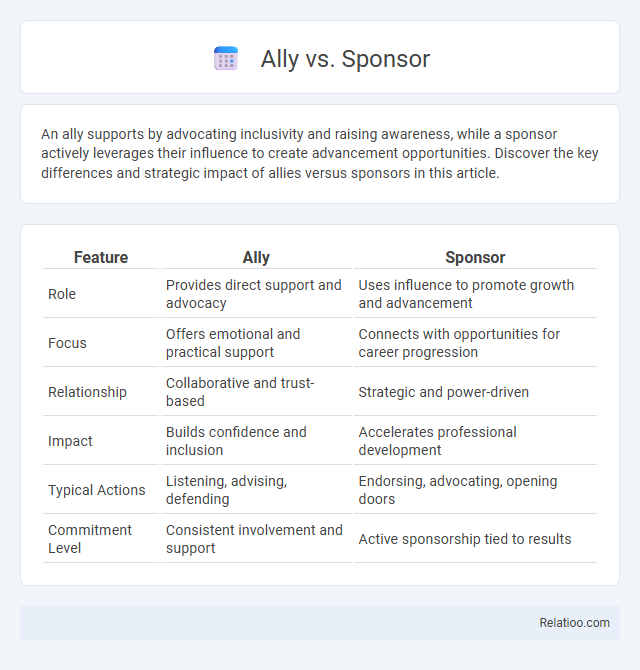An ally supports by advocating inclusivity and raising awareness, while a sponsor actively leverages their influence to create advancement opportunities. Discover the key differences and strategic impact of allies versus sponsors in this article.
Table of Comparison
| Feature | Ally | Sponsor |
|---|---|---|
| Role | Provides direct support and advocacy | Uses influence to promote growth and advancement |
| Focus | Offers emotional and practical support | Connects with opportunities for career progression |
| Relationship | Collaborative and trust-based | Strategic and power-driven |
| Impact | Builds confidence and inclusion | Accelerates professional development |
| Typical Actions | Listening, advising, defending | Endorsing, advocating, opening doors |
| Commitment Level | Consistent involvement and support | Active sponsorship tied to results |
Understanding Allies and Sponsors: Key Differences
Understanding the key differences between allies and sponsors is crucial for maximizing your career growth. Allies provide support and advocacy within your network by offering guidance and encouragement, while sponsors actively leverage their influence and resources to create visible opportunities and advance your professional trajectory. Knowing how to engage both allies and sponsors strategically can significantly enhance your access to mentorship, promotions, and leadership roles.
What is an Ally in the Workplace?
An ally in the workplace actively supports and advocates for marginalized colleagues by using their privilege to promote equity and inclusion. Unlike sponsors who directly advance your career through opportunities and endorsements, allies focus on raising awareness, challenging biases, and fostering a respectful environment. Your role as an ally involves consistent learning, speaking up against injustice, and creating a safe space for diverse voices to be heard.
Defining a Sponsor: More Than Just Support
A sponsor goes beyond the role of an ally by actively leveraging their influence and networks to create tangible opportunities for their proteges, such as promotions or key projects. Unlike allies who offer encouragement and solidarity, sponsors take strategic risks to advocate for career advancement within organizational hierarchies. Their commitment involves direct intervention and resource allocation that can significantly accelerate professional growth and visibility.
Roles and Responsibilities: Ally vs Sponsor
An ally actively supports underrepresented groups by amplifying their voices, advocating for equitable treatment, and fostering inclusive environments through everyday actions and consistent commitment. A sponsor, in contrast, leverages their organizational influence and resources to advocate for mentees' career advancement, providing direct opportunities, visibility, and access to decision-makers. While allies build awareness and support culture change, sponsors play a critical role in accelerating professional growth by endorsing and recommending individuals for promotions, high-impact projects, or leadership roles.
Impact of Allies on Career Development
Allies play a crucial role in career development by providing support, advocacy, and access to opportunities within professional networks. Unlike sponsors, who actively leverage their influence to promote an individual's advancement, allies primarily offer encouragement and mentorship, helping to build confidence and skills. The impact of allies is significant in fostering inclusive workplace cultures and enabling sustained career growth through consistent guidance and support.
How Sponsors Accelerate Advancement
Sponsors play a crucial role in career advancement by actively advocating for their proteges, leveraging their influence to open doors to high-visibility projects and leadership opportunities. Unlike allies who offer support and counsel, sponsors take direct action to promote advancement within organizational hierarchies, often accelerating promotion timelines. This targeted sponsorship drives accelerated career growth by connecting individuals with critical resources, executive networks, and decision-makers essential for leadership development.
Identifying Effective Allies and Sponsors
Effective allies actively support others by advocating for their growth and providing resources, while sponsors leverage their influence to create advancement opportunities and visibility for proteges. Identifying effective allies involves recognizing individuals who consistently offer encouragement and guidance without expecting direct benefits, whereas effective sponsors are those positioned in decision-making roles who openly endorse and promote talent. Both allies and sponsors are crucial for professional development, but sponsors often have greater impact on career progression due to their ability to open doors within organizational hierarchies.
Building Relationships: Allyship vs Sponsorship
Allyship involves actively supporting and advocating for underrepresented individuals without necessarily having formal power, focusing on empathy and solidarity to build trust and genuine connections. Sponsorship goes further by leveraging organizational influence to promote career advancement and create tangible opportunities, directly impacting professional growth. Building relationships in allyship centers on consistent support and understanding, while sponsorship emphasizes strategic advocacy and resource allocation to empower others.
Common Misconceptions About Allies and Sponsors
Misconceptions often confuse allies and sponsors, assuming both provide equal support in professional growth and advocacy. Allies primarily offer social support and vocal encouragement within the workplace, while sponsors actively leverage their influence and networks to create advancement opportunities for proteges. Understanding the distinct roles clarifies that sponsors have a strategic, career-accelerating impact beyond the interpersonal backing commonly attributed to allies.
Choosing the Right Support: When Do You Need an Ally or Sponsor?
Choosing the right support depends on your career goals and the level of advocacy you require. An ally provides encouragement and informal guidance, while a sponsor actively promotes your growth and opportunities within an organization. Understanding your needs helps you determine when you need an ally's support or a sponsor's influential backing to advance your professional journey.

Infographic: Ally vs Sponsor
 relatioo.com
relatioo.com